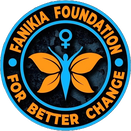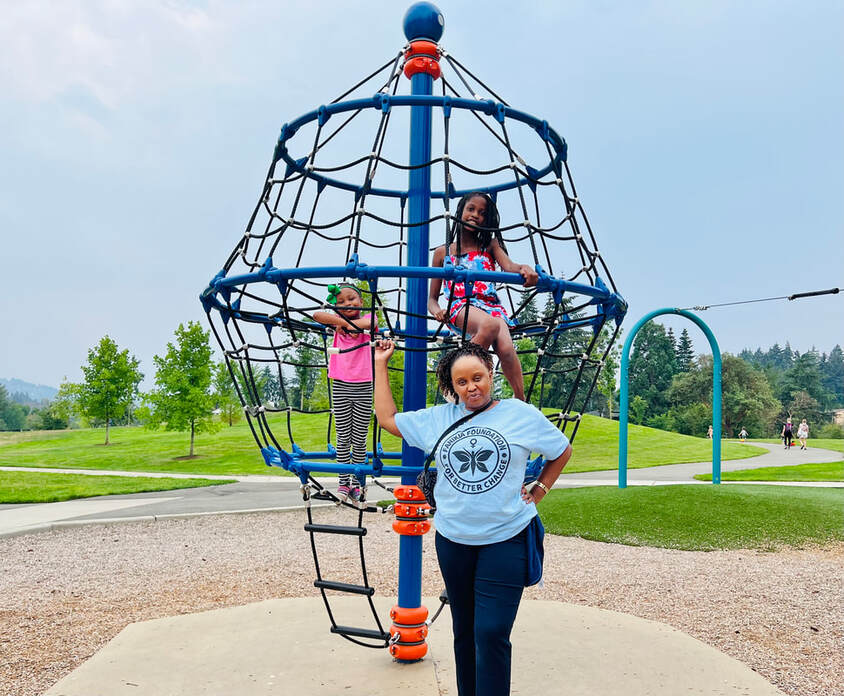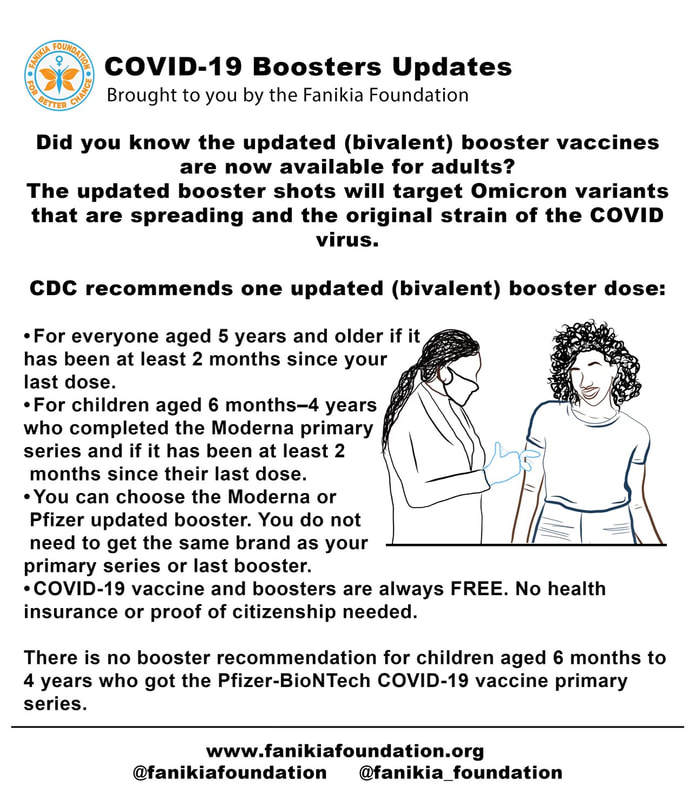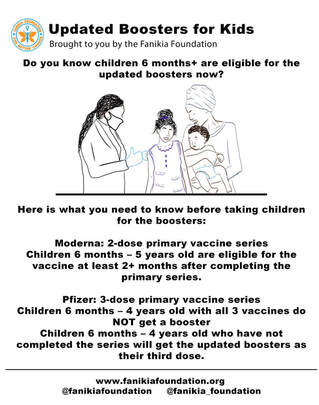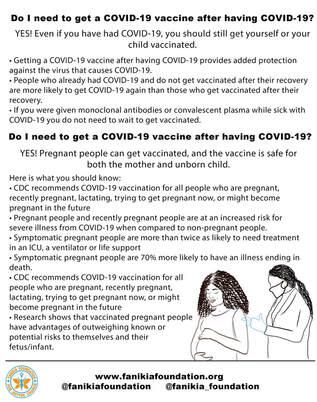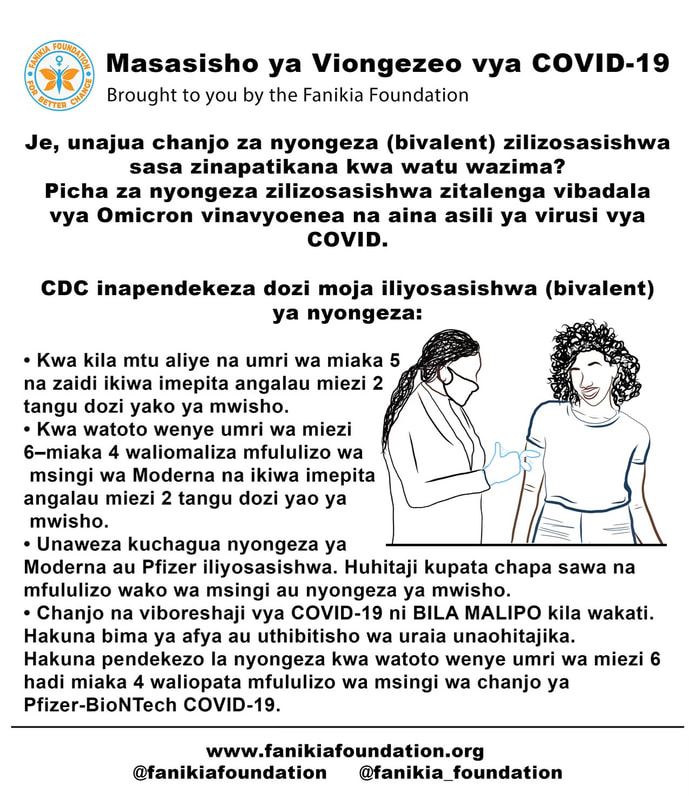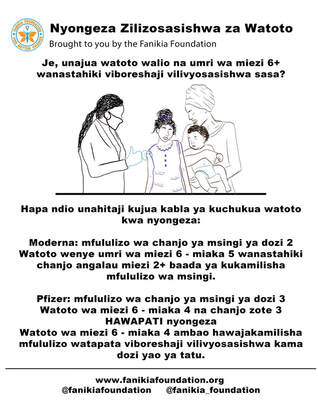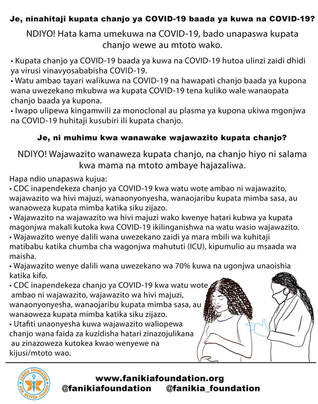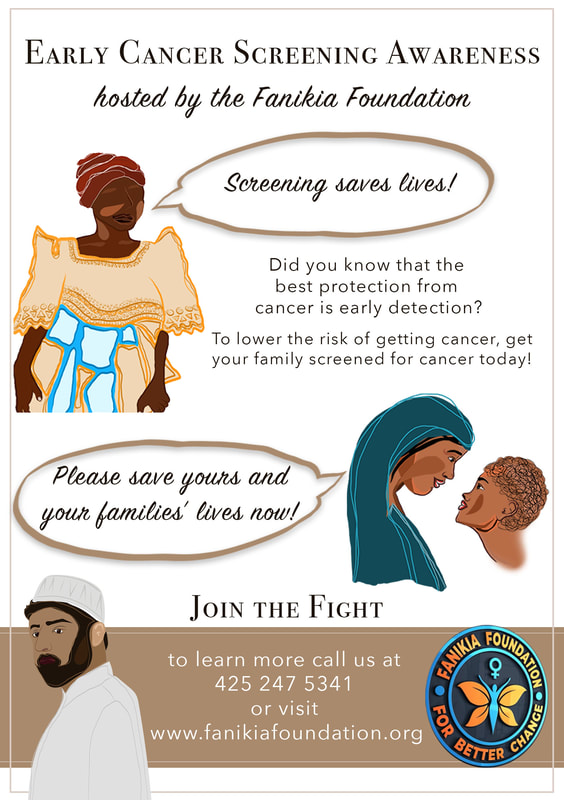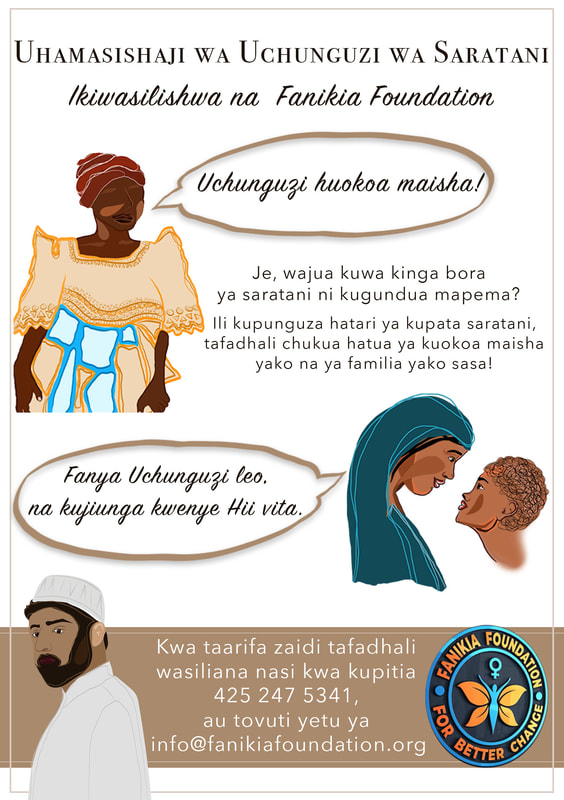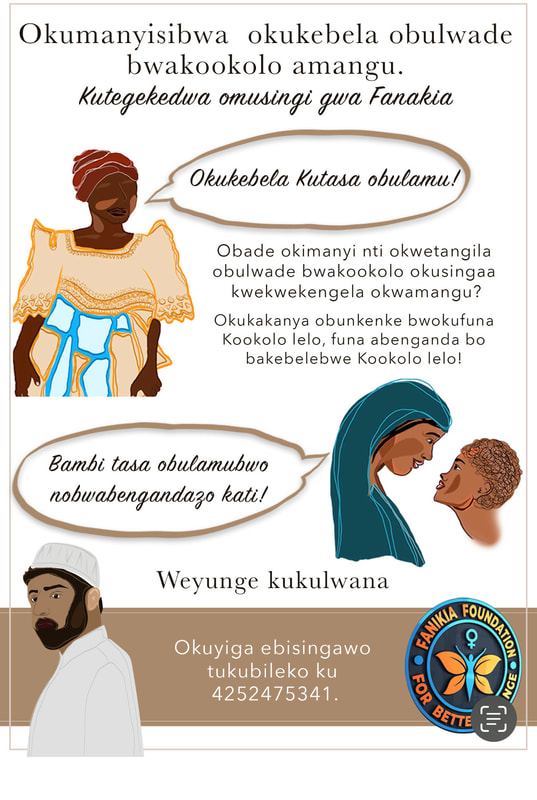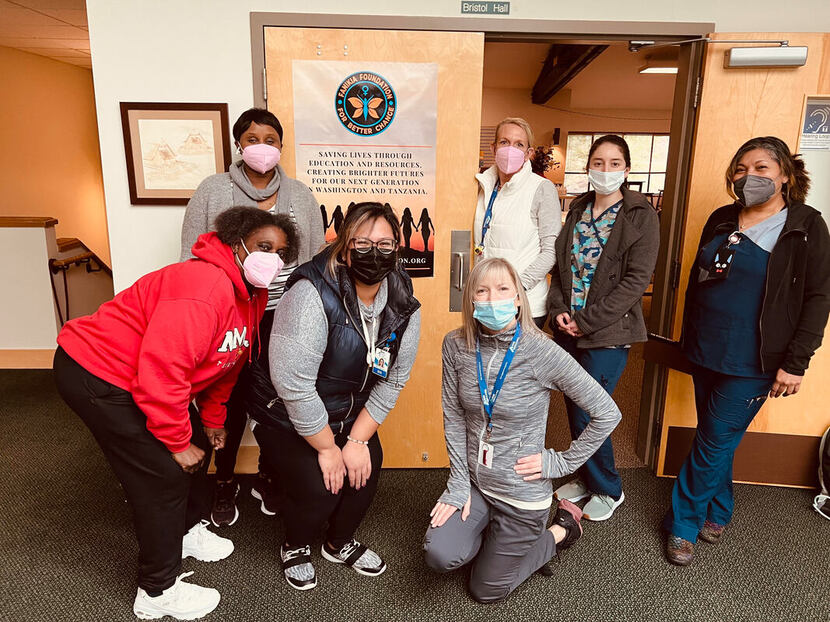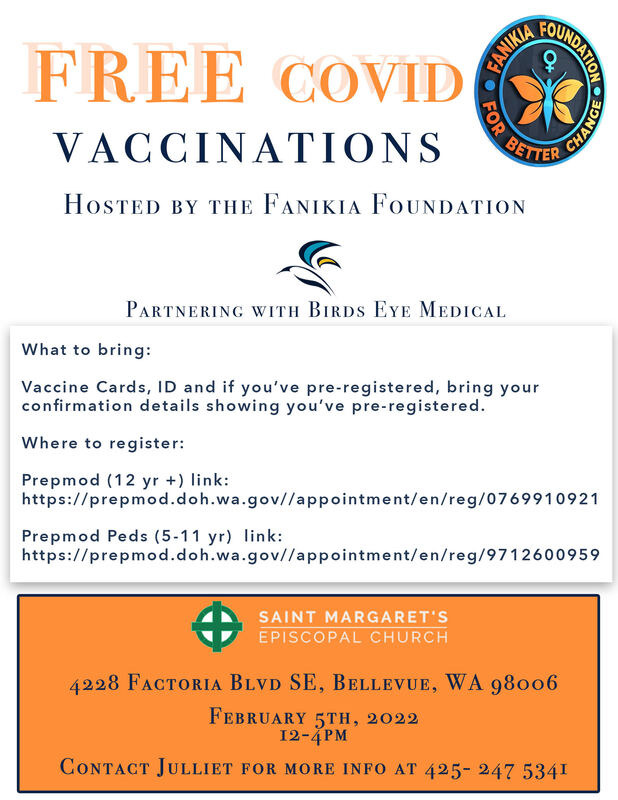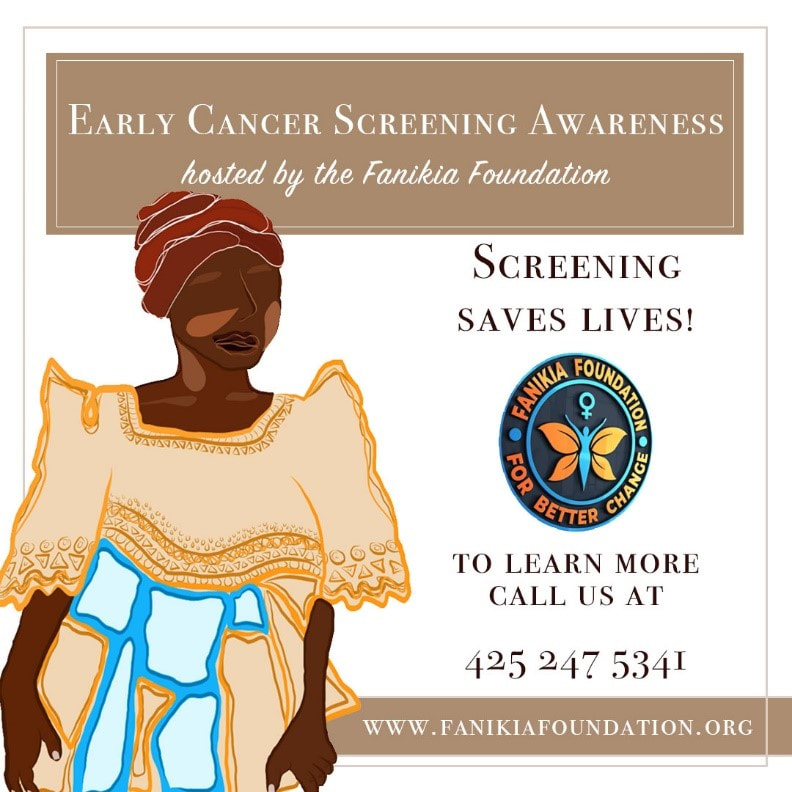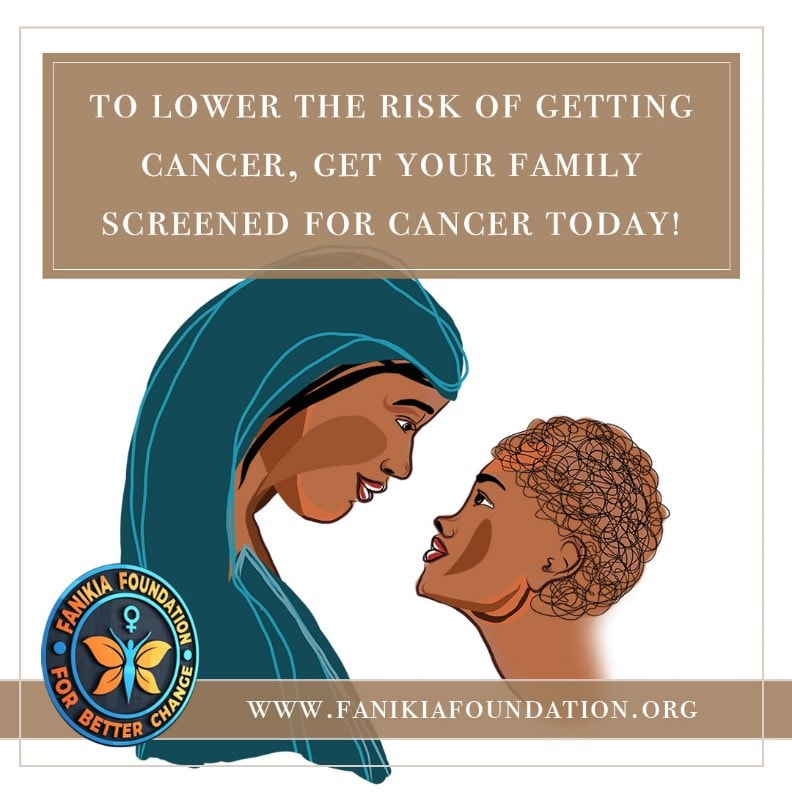Fanikia aims to increase vaccine confidence among underserved East African Immigrant communities/families to increase pediatric Covid-19 vaccine and other vaccines.
Covid-19 vaccines are now available for children from 6 months of age. Let's fight this virus together!/Chanjo za Covid-19 sasa zinapatikana kwa watoto kuanzia umri wa miezi 6. Wacha tupigane na virusi hivi pamoja!
Updated Covid-19 Information/Taarifa ya Covid-19 iliyosasishwa
Bridging the gap between early detection of cancer in East African immigrants and access to cancer-related services and health care systems in Washington State.
FREE COVID VACCINATION WASHINGTON STATE.
COVID 19 HEALTH LITERACY PROJECT |
|
|
Updated Covid 19 Information/Taarifa ya Covid 19 iliyosasishwa
COVID 19 VACCINATION
Free COVID-19 Vaccine Event in Bellevue for our community.
In partnership with Birds Eye Medical
Fanikia will host a clinic at Bellevue on February 5th offering:
Pediatric Pfizer, Moderna and JJ vaccine first or second shots for students aged 5-11,
Pfizer, Moderna and Jj first or second shots for students aged 12 and up and adults, and
Pfizer and Moderna booster doses for students aged 12 and up and adults.
Clinic at St Margaret Episcopal Church
When: Saturday, February 6, 2022
12 p.m. to 4:00 p.m.
Medical Provider: Birds Eye Medical
Sign up using the link below to schedule a COVID-19 vaccine appointment:
In partnership with Birds Eye Medical
Fanikia will host a clinic at Bellevue on February 5th offering:
Pediatric Pfizer, Moderna and JJ vaccine first or second shots for students aged 5-11,
Pfizer, Moderna and Jj first or second shots for students aged 12 and up and adults, and
Pfizer and Moderna booster doses for students aged 12 and up and adults.
Clinic at St Margaret Episcopal Church
When: Saturday, February 6, 2022
12 p.m. to 4:00 p.m.
Medical Provider: Birds Eye Medical
Sign up using the link below to schedule a COVID-19 vaccine appointment:
Tukio la Bila malipo la Chanjo ya COVID-19!
Fanikia Foundation kwa kushirikiana na Birds Eye Medical inaanda kliniki mji wa Bellevue mnamo Februari 5:
* Pediatric Pfizer, Moderna na JJ chanjo ya kwanza au ya pili kwa watoto miaka 5-11,
* Pfizer, Moderna na Jj chanjo za kwanza au za pili kwa watoto/vijqna wenye umri wa miaka 12 na zaidi na watu wazima, na
* Vipimo vya nyongeza vya Pfizer na Moderna kwa watoto/vijanw wenye umri wa miaka 12 na zaidi na watu wazima.
Sehemu: Kanisa la St Margaret Episcopal
Wakati: Jumamosi, Februari 5,2022
6 mchana hadi 10 jioni.
Mtoa Matibabu: Birds Eye Medical
Jisajili kwa kutumia kiungo kilicho hapa chini ili kuratibu miadi ya chanjo ya COVID-19:
Fanikia Foundation kwa kushirikiana na Birds Eye Medical inaanda kliniki mji wa Bellevue mnamo Februari 5:
* Pediatric Pfizer, Moderna na JJ chanjo ya kwanza au ya pili kwa watoto miaka 5-11,
* Pfizer, Moderna na Jj chanjo za kwanza au za pili kwa watoto/vijqna wenye umri wa miaka 12 na zaidi na watu wazima, na
* Vipimo vya nyongeza vya Pfizer na Moderna kwa watoto/vijanw wenye umri wa miaka 12 na zaidi na watu wazima.
Sehemu: Kanisa la St Margaret Episcopal
Wakati: Jumamosi, Februari 5,2022
6 mchana hadi 10 jioni.
Mtoa Matibabu: Birds Eye Medical
Jisajili kwa kutumia kiungo kilicho hapa chini ili kuratibu miadi ya chanjo ya COVID-19:
PROVIDING ACESS TO CANCER CARE FOR EAST AFRICAN IMMIGRANT LIVING IN WAHSINGTON STATE
PROJECT NAME: Bridging the gap between early detection of cancer in East African immigrants and access to cancer-related services and health care systems in King County and surrounding
INTRODUCTION: African immigrants experience disproportionate impacts of cancer. In recent years research has shown that US cancer cases have increased substantially among African immigrants (Paulo S. Pinheiro, 2020), as has the number of African immigrants itself (Paulo S. Pinheiro, 2020). This increase has led to a greater need for access to preventive care for those immigrants. Additionally, research has shown that the overall rate of cancer screenings is lower among African immigrants compared to other races/nations (Michelle Tong, 2022). This in turn, has increased the mortality rate in the African immigrant community, because most of them are diagnosed with cancer at a late stage (Alejandra Hurtado-de-Mendoza, 2014). Researchers have identified health inequities caused by different factors, such as lack of health insurance; immigration status (mostly undocumented immigrants); the perception of cancer screening due to culture and religion; lack of money; lack of support, encouragement, or recommendation to participate in screening; lack of clear information mainly due to language barriers; lack of access to resources for care; and discrimination as being the major cause of this problem (Baciu A, 2017). Also, lack of clarity does not allow to define baseline for screening it is hard to see the gap, but we know it is there. Interventions to improve cancer outcomes in African immigrants are needed. Research that includes larger samples with diverse African subgroups including cancer survivors are necessary to inform future directions. RESEARCH QUESTION: To improve cancer education and access to care for African immigrant in King County and the surrounding counties
GOALS:
INTRODUCTION: African immigrants experience disproportionate impacts of cancer. In recent years research has shown that US cancer cases have increased substantially among African immigrants (Paulo S. Pinheiro, 2020), as has the number of African immigrants itself (Paulo S. Pinheiro, 2020). This increase has led to a greater need for access to preventive care for those immigrants. Additionally, research has shown that the overall rate of cancer screenings is lower among African immigrants compared to other races/nations (Michelle Tong, 2022). This in turn, has increased the mortality rate in the African immigrant community, because most of them are diagnosed with cancer at a late stage (Alejandra Hurtado-de-Mendoza, 2014). Researchers have identified health inequities caused by different factors, such as lack of health insurance; immigration status (mostly undocumented immigrants); the perception of cancer screening due to culture and religion; lack of money; lack of support, encouragement, or recommendation to participate in screening; lack of clear information mainly due to language barriers; lack of access to resources for care; and discrimination as being the major cause of this problem (Baciu A, 2017). Also, lack of clarity does not allow to define baseline for screening it is hard to see the gap, but we know it is there. Interventions to improve cancer outcomes in African immigrants are needed. Research that includes larger samples with diverse African subgroups including cancer survivors are necessary to inform future directions. RESEARCH QUESTION: To improve cancer education and access to care for African immigrant in King County and the surrounding counties
GOALS:
- To improve the system that develops and publishes cancer and cancer-related services information and materials by making it culturally and linguistically responsive to African immigrant communities.
- To mobilize African immigrants in King County and neighboring counties to support improvements to systems that disseminate information about cancer screening
RESOURCES ON CANCER CARE RELATED SERVICE
- https://www.seattlecca.org/services/patient-navigators#:~:text=Patient%20navigators%20are%20culturally%20sensitive,people%20face%20a%20cancer%20diagnosis.
- https://www.seattlecca.org/patients/patient-education
- https://www.seattlecca.org/diseases
- https://www.seattlecca.org/services
- https://kingcounty.gov/depts/health/chronic-diseases/breast-cervical-colon-health/~/media/depts/health/chronic-diseases/breast-cervical-colon-health/documents/BCCHP-Manual-Chapter-7.ashx
- https://doh.wa.gov/you-and-your-family/illness-and-disease-z/cancer/about-comprehensive-cancer-control
- https://kingcounty.gov/depts/health/chronic-diseases/breast-cervical-colon-health.aspx
